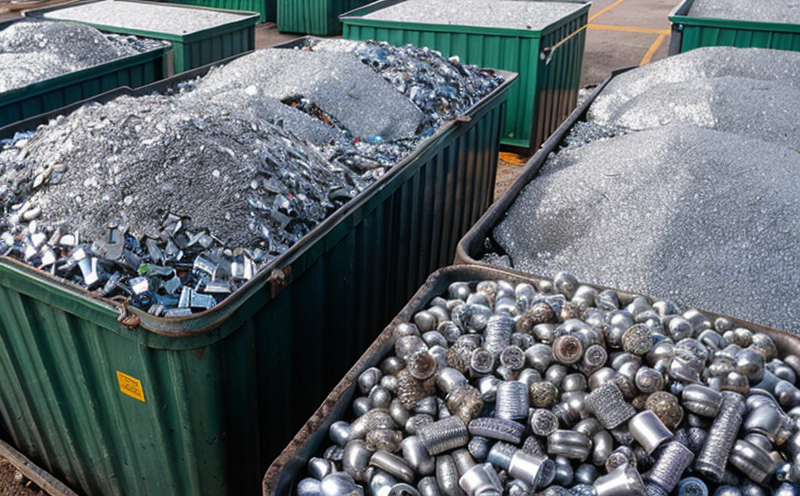ISO 21068 Analysis of Recycled Ferrous Alloys
The ISO 21068 standard provides a comprehensive framework for the analysis and characterization of recycled ferrous alloys. This service is particularly valuable in sectors such as steel manufacturing, scrap processing, and environmental compliance where the quality and composition of recycled materials directly impact product performance and sustainability. The standard ensures that recycled ferrous alloys meet stringent specifications regarding chemical composition, mechanical properties, and potential contaminants.
The primary objective of ISO 21068 is to provide a consistent methodology for analyzing the elemental content of recycled ferrous alloys. This includes critical elements such as iron, carbon, manganese, silicon, phosphorus, sulfur, and chromium. The analysis helps in understanding the alloy's characteristics which are essential for optimizing recycling processes and ensuring product quality.
The testing process involves several key steps: sample preparation, analytical methods, and interpretation of results. Sample preparation is crucial to ensure representative samples that accurately reflect the composition of the recycled alloys. Once prepared, the samples undergo a series of tests using advanced spectroscopic techniques such as Inductively Coupled Plasma Mass Spectrometry (ICP-MS) and X-ray Fluorescence (XRF). These methods provide precise measurements of elemental concentrations.
The results are then compared against specified limits outlined in ISO 21068 to determine compliance with the standard. Compliance ensures that recycled ferrous alloys can be used reliably in various applications, from automotive parts to construction materials. This service not only supports regulatory requirements but also enhances product quality and reduces environmental impact by promoting sustainable material reuse.
In addition to elemental analysis, ISO 21068 also addresses mechanical properties such as tensile strength, yield strength, and elongation. These tests are conducted using standard test specimens in accordance with relevant international standards like ASTM E8 or EN 10005. The results provide valuable insights into the mechanical behavior of recycled alloys under various conditions.
The service also includes a detailed report that outlines all findings from the analysis, including elemental composition, mechanical properties, and any detected contaminants. This comprehensive approach ensures transparency and traceability throughout the recycling process. By adhering to ISO 21068 standards, stakeholders in waste management and metal recycling can confidently use recycled ferrous alloys in their operations.
The implementation of this service contributes significantly to sustainable practices by reducing raw material consumption and minimizing waste. It also supports compliance with environmental regulations while enhancing product quality through precise control over the composition of recycled materials.
Industry Applications
| Application Area | Description |
|---|---|
| Steel Manufacturing | Evaluating the suitability of recycled ferrous alloys for new steel production, ensuring compliance with quality standards. |
| Scrap Processing | Analyzing scrap metal to determine its composition and potential use in recycling processes. |
| Automotive Manufacturing | Assessing the recyclability of automotive components made from ferrous alloys, ensuring proper disposal and reuse. |
| Bronze & Brass Recycling | Evaluating recycled bronze and brass for their suitability in manufacturing new products. |
| Environmental Compliance | Satisfying regulatory requirements by ensuring that recycled materials meet specified environmental standards. |
| Application Area | Description |
|---|---|
| Aerospace Manufacturing | Evaluating the use of recycled ferrous alloys in aerospace components to ensure durability and safety. |
| Construction Industry | Analyzing scrap metal from construction sites for reuse, promoting sustainability in building materials. |
| R&D & Innovation | Supporting research into the development of new recycling technologies and processes. |
| E-Waste Management | Evaluating recycled metals extracted from electronic waste to ensure they meet quality standards for reuse. |
The ISO 21068 Analysis of Recycled Ferrous Alloys service is widely applicable across various industries, particularly in sectors that rely heavily on recycled materials. By leveraging this standard, businesses can enhance their sustainability efforts while maintaining high-quality product performance.
Eurolab Advantages
At Eurolab, we pride ourselves on delivering expert analysis services for the ISO 21068 standard. Our team of highly skilled professionals ensures accurate and reliable testing results every time. With state-of-the-art equipment and rigorous quality control measures, we provide consistent compliance with international standards.
We offer a wide range of additional value-added services to support our clients' needs beyond just the core analysis. These include technical consulting, training programs, and custom solutions tailored to specific project requirements. Our goal is not only to meet but exceed expectations by providing comprehensive service packages that cater to diverse client needs.
Customer Impact and Satisfaction
Our commitment to excellence has earned us a reputation for delivering top-notch services in waste management and recycling testing. Many of our clients have reported significant improvements in their operational efficiency, reduced costs associated with non-compliance, and enhanced product quality through the use of ISO 21068-compliant recycled materials.
Customer satisfaction is at the heart of our business model. We consistently strive to meet or exceed customer expectations by offering prompt service delivery, clear communication, and transparent reporting. Our clients appreciate our ability to provide detailed insights into their recycling processes, helping them make informed decisions that lead to better outcomes.





